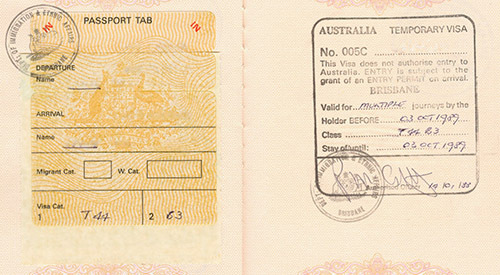- Winter 2022
- Plaintiff M1/2021 v Minister for Home Affairs [2022] HCA 17

In Plaintiff M1/2021 v Minister for Home Affairs [2022] HCA 17 the High Court examined how the Minister should consider representations to revoke a visa cancellation decision on the ground of facing persecution, torture and death, contrary to Australia’s non-refoulement obligations, in circumstances where the person could apply for a protection visa.
The plaintiff, a South Sudanese citizen, had lived in Australia since the age of 19. He arrived in 2006 on a Refugee and Humanitarian (Class XB) Subclass 202 (Global Special Humanitarian) visa. In 2017, he was sentenced to an aggregate term of 12 months imprisonment for two counts of unlawful assault. His visa was cancelled (the cancellation decision) under s 501(3A) of the Migration Act 1958 (Cth) (Migration Act). The plaintiff was given notice of the cancellation decision and invited to make representations on its revocation.
Under s 501(3A) of the Migration Act, cancellation of a visa is mandatory if the minister is satisfied that a person does not pass the character test because he or she has a substantial criminal record – defined under s 501(7)(c) to include a sentence to a term of imprisonment of 12 months or more – and is serving a full-time custodial sentence.
Section 501CA(3) provides that ‘[a]s soon as practicable’ after making a cancellation decision the minister must give the person written notice setting out the decision and the basis on which it was made, and invite the person to ‘make representations’ about its revocation. The minister may revoke the original decision if such representations are made, and the minister is satisfied that the person either passes the character test or there is ‘another reason’ for revoking the original decision (s 501CA(4)).
The plaintiff’s representations stated that ‘[s]ending me back to South Sudan is sentencing me to the same fate as my father... I will either get killed, or persecuted then killed, or tortured then killed’ (see [48] (Edelman J)).
On 9 August 2018, a delegate of the minister decided not to revoke the cancellation decision. As summarised in the majority judgment (at [5]), the delegate: considered it was unnecessary to determine whether non-refoulement obligations were owed in respect of the plaintiff because the plaintiff could make a valid application for a protection visa and the existence or otherwise of non-refoulement obligations would be fully assessed in the course of processing such an application.
The key issue facing the High Court was how, in deciding whether there was ‘another reason’ to revoke the cancellation decision under 501CA(4)(b)(ii), the delegate was required to consider the plaintiff’s representations (see [8] (Kiefel CJ, Keane, Gordon and Steward JJ)). The majority found (at [9]):
(1) The delegate was required to read, identify, understand and evaluate the plaintiff’s representations […] that raised a potential breach of Australia’s international non-refoulement obligations;
(2) Australia’s international non-refoulement obligations unenacted in Australia were not a mandatory relevant consideration; and
(3) to the extent Australia’s international non-refoulement obligations are given effect in the Migration Act, one available outcome for the delegate was to defer assessment of whether the plaintiff was owed those non-refoulement obligations on the basis that it was open to the plaintiff to apply for a protection visa under the Migration Act.
Where assessment of potential non-refoulement obligations is so deferred, the decision-maker may nonetheless need to ‘take account of the alleged facts underpinning that claim where those facts are relied upon … in support of there being ‘another reason’’ for revoking the cancellation decision (at [39]).

In the course of the hearing, Gleeson J noted that the effect of the minsiter’s argument, if accepted, was to potentially overturn two lines of authority in the Federal Court (see [2021] HCA Trans 203). After the hearing, the minister provided the High Court with a list of Federal Court decisions, identifying paragraphs in each that were said to be inconsistent with the argument put: (see [2021] HCA Trans 203; majority judgment at [31]). In the judgment, the majority interrogated what it described as five ‘paths of reasoning’ in those decisions. It considered that three of those paths should not be adopted to the extent they supported the conclusion that a decision-maker could not defer consideration of non-refoulement obligations (at [32]). The fourth was found to be inconsistent with the statutory scheme ([33]), while the fifth path was considered to be addressed by direction 75 and legislative developments ([35]).
The majority found that the delegate had read and understood the plaintiff’s claim. The conclusion that non-refoulement obligations could be assessed in a later protection visa application was a ‘reasonable and rational justification for not giving weight to potential non-refoulement obligations as ‘another reason’ for revoking the cancellation decision’. Consequently, the delegate did not fail to exercise the jurisdiction conferred by s 501CA(4) or deny the plaintiff procedural fairness ([38]).
Justice Gageler considered the key question of law stated for the opinion of the Full Court (question 1) to be ‘inappropriate to answer’ – ‘unduly abstract’ and ‘cast in contentious and ambiguous language’ ([43]– [44]). His Honour did not however disagree with the majority judgment’s reasoning on this question and agreed with the other answers proposed ([43]).
Justice Edelman and Justice Gleeson each dissented. Justice Edelman considered that the delegate had denied the plaintiff procedural fairness ([100]). The delegate’s approach was ‘not a legally reasonable consideration of the plaintiff’s representations as a whole’ and the plaintiff was ‘entitled to have reasonable consideration given to his representations that he would be persecuted, tortured, and killed’ ([53]). This entitlement was consistent with a ‘long line of authority in the Federal Court, including the Full Court’. Reflecting on the Federal Court’s ‘vast experience’ on migration law, his Honour considered that the High Court should ‘pause for serious thought before concluding that such a large swathe of decisions of the Federal Court should be overturned’ ([53]).
Justice Gleeson also found that the plaintiff was denied procedural fairness ([115]–[116]). Her Honour was ‘unable to accept that the delegate’s reasons record, beyond assertion, adequate consideration of the issues of fact presented by the plaintiff’s non-refoulement claims’ ([108]).
The plaintiff did apply – unsuccessfully – for a protection visa. Although he was found to face a real chance of being ‘forced into destitution, extorted, kidnapped and possibl[y] killed’, ss 36(1C)(b) and 36(2C)(b)
(ii) of the Migration Act preclude the grant of a protection visa to a person whom the minister considers on reasonable grounds poses a danger to the Australian community, having been convicted by final judgment of a particularly serious crime (see Edelman J, [62] – [63]). BN
